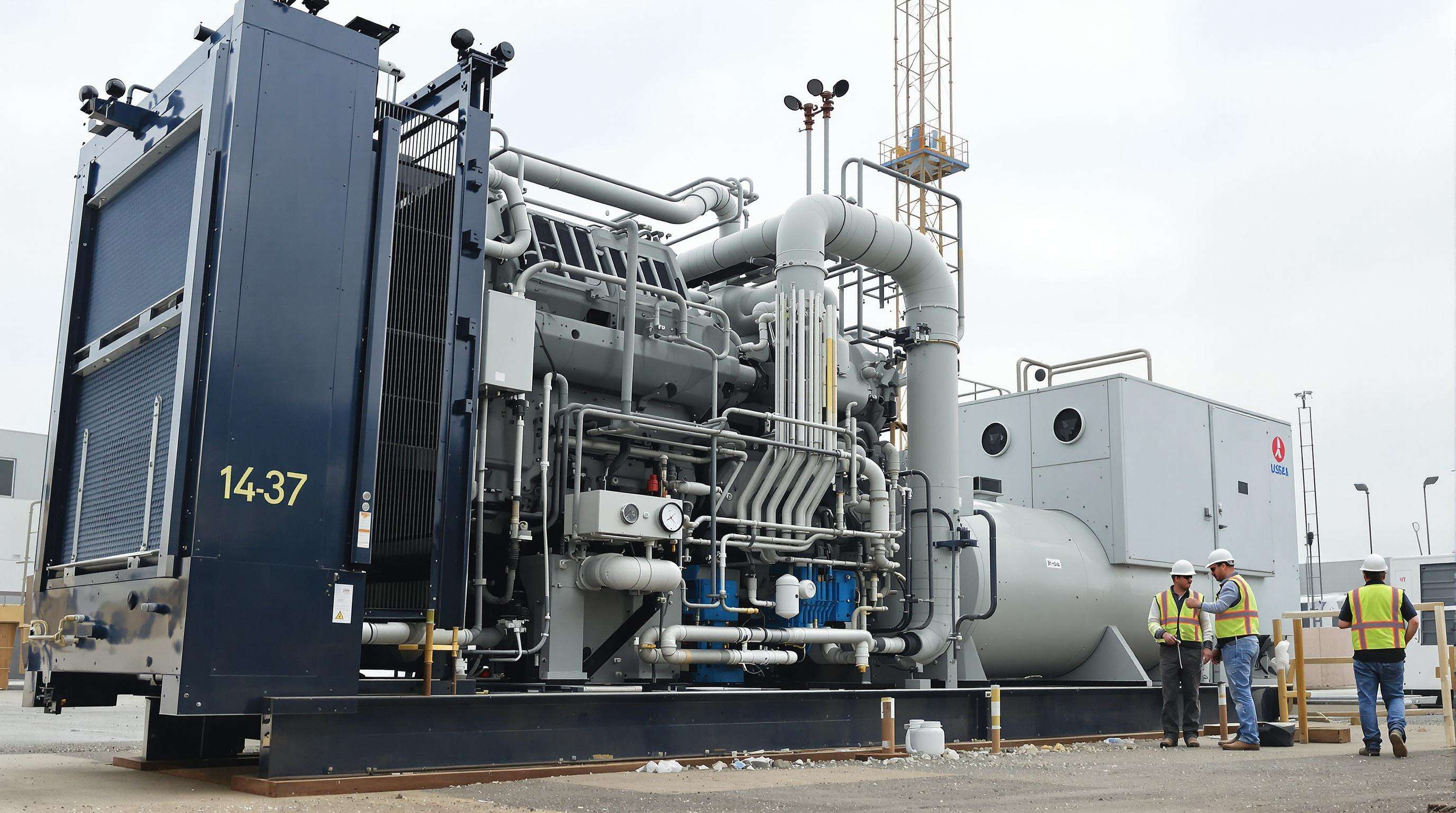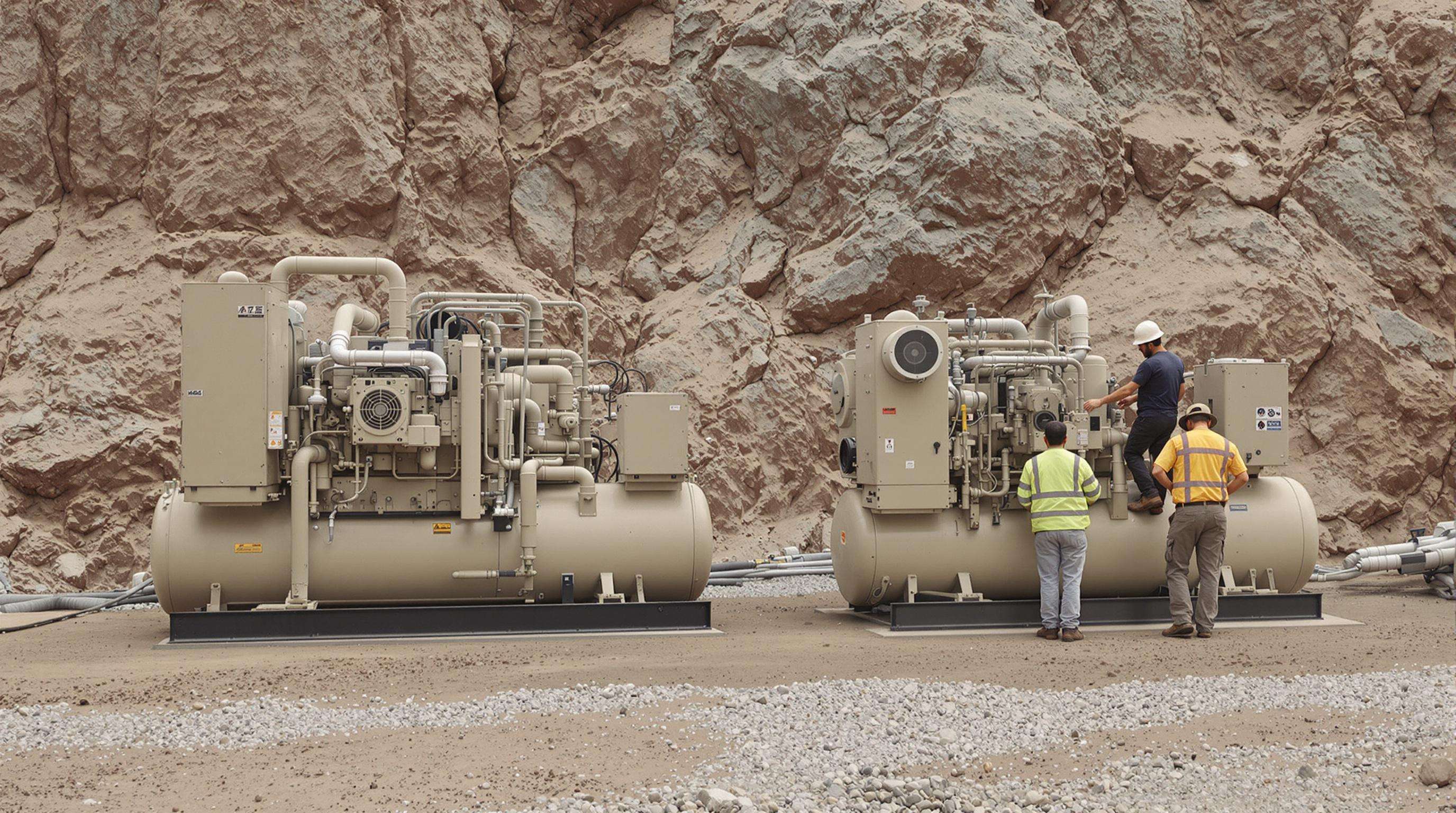Maximizing Energy Efficiency with Diesel Air Compressors

How diesel air compressors convert fuel to compressed air more efficiently
Diesel powered air compressors work better because diesel has more energy packed into it than regular gas does. This means they can turn fuel into compressed air more efficiently overall. The way these machines are built keeps the engine running at just the right temperature so less heat gets lost when making pressure. What makes them stand out is their ability to keep performing well even when not working at full capacity. This matters a lot for jobs where demand changes throughout the day. Most folks in the industry report around a 30 percent drop in wasted energy compared to older models that run on standard fuels.
Advanced technologies: Fuel injection, turbocharging, and thermal efficiency
Today's diesel compressors rely on computer controlled fuel injection systems that adjust fuel delivery based on what the engine actually needs at any given moment. This helps burn fuel more completely and cuts down on harmful emissions. When manufacturers add turbochargers to these engines, they're basically forcing more air into the combustion chamber which means more power comes out without needing extra fuel. Some models also include waste heat recovery systems that grab all that leftover heat from exhaust gases and put it back into useful work somewhere else in the system. All these improvements combined mean operators can save around 37 cents for every dollar spent compared to running older equipment. And looking ahead, new hybrid regeneration technologies promise even better savings as companies continue to refine their approaches to energy management.
Diesel vs. electric: A comparative analysis of energy utilization
When working off the grid, diesel compressors generally perform better than their electric counterparts because they don't have to deal with all those electricity generation and transmission losses. Research indicates that diesel units actually use about 15 to 20 percent less overall energy once we account for how inefficient grid power distribution really is. The difference becomes even bigger in truly remote locations where electric compressors need backup generators running alongside them, which creates these double conversion losses nobody wants. For facilities still connected to the main power grid, what matters most is looking at what electricity costs locally and how green that power actually is from an environmental standpoint.
Reducing Operating Costs Through Diesel Power
Key cost drivers in air compressor operations
Fuel accounts for 40–65% of lifetime operating costs for industrial air compressors, while unplanned downtime can cost $520 per hour in lost productivity. Maintenance adds another 20–30% to operational expenses, particularly in harsh environments like construction or mining. These factors make efficiency and reliability central to cost-effective operations.
Fuel efficiency and reduced downtime in diesel models
When it comes to fuel efficiency, diesel compressors typically outperform their gasoline equivalents by around 25 to 40 percent. Why? Because diesel has more BTUs per gallon and benefits from improved combustion tech. The savings really add up over time, cutting down on fuel expenditures particularly when machines run nonstop day after day. Another big plus for diesel units is their durability factor. Field tests show they experience about thirty percent fewer unexpected breakdowns than electric alternatives when deployed away from power grids. Fewer breakdowns means projects stay on schedule and companies avoid those costly last minute repairs that can derail budgets completely.
Real-world savings: Case study from a remote mining operation
Field analysis from a Nevada mining project highlights the economic benefits of diesel compressors:
| Category | Diesel Compressor | Electric Compressor |
|---|---|---|
| Monthly fuel cost | $2,900 | $4,800* |
| Downtime incidents | 2 (seasonal) | 11 (unplanned) |
| Annual maintenance | $1,900 | $3,200 |
*Includes generator fuel and power transmission costs
Switching to diesel-powered units resulted in 32% lower annual operating costs, despite higher initial equipment investment.
Long-term cost-effectiveness and predictive maintenance tools
Diesel air compressors tend to run for around 15,000 hours before needing major work, which is almost twice as long as what we see with regular electric models that usually clock in at somewhere between 8,000 and 10,000 hours of operation. The newer IoT equipped versions come with these smart maintenance systems that can actually predict when something might go wrong, getting it right about 89 out of 100 times by keeping tabs on things like oil breakdown, how well filters are working, and strange combustion patterns. When companies schedule their maintenance checks during already planned shutdown periods instead of waiting for breakdowns, they end up extending those service intervals by roughly 40%. What this means in practice is that maintenance stops being just another expense on the books and starts becoming something that gives businesses a real edge in operations.
Total Cost of Ownership: Reliability and Maintenance Advantages

Balancing higher upfront costs with lower lifetime expenses
While diesel air compressors usually come with a price tag 15 to 30 percent higher than electric ones at first glance, they actually save money in the long run thanks to better performance and longer life. The latest combustion tech cuts down on fuel usage by around a quarter, plus there are no delicate electrical parts to worry about when surges happen. Mining companies have found that over ten years, these machines save them roughly $120k each according to industry reports from 2024. The savings really stack up for operations running them more than six hours every day, making them worth the initial investment despite the higher purchase cost.
Durability in harsh environments: Why diesel units last longer
Diesel compressors excel in extreme conditions due to rugged construction and simplified power systems. Key advantages include:
- Reinforced casings and components resistant to dust and debris in mining or demolition
- No electrical windings vulnerable to moisture damage
- Operational stability in temperatures ranging from -20°C to 50°C
Data shows these units achieve 35% longer service intervals and surpass 15,000 operating hours before major overhaul—nearly doubling typical equipment lifespans under similar conditions.
Maintenance best practices to extend diesel compressor lifespan
Proactive maintenance is critical to maximizing diesel compressor performance and longevity. Recommended practices include:
- Filter management: Replace air intake filters every 250 hours in high-dust environments
- Fluid discipline: Perform oil analysis every 500 hours and change fluids biannually
- Component monitoring: Conduct monthly inspections of couplings and tensioning
Operations with 95% maintenance compliance see 22% lower TCO and extend equipment life beyond 20,000 hours, while reducing unexpected downtime by 60% (2024 Compressor Reliability Report).
High Performance in Remote and Off-Grid Applications
Why Diesel Air Compressors Dominate in Remote Construction and Mining
When it comes to working off the grid, diesel compressors remain king, especially since around 8 out of 10 mining locations simply don't have dependable electricity access according to that Industrial Energy Report from last year. These machines can run for ages on their own fuel supply and handle all sorts of harsh conditions too. They keep going strong even when there's tons of dust floating around or temperatures swing wildly between extremes. Humidity isn't much of a problem either. Electric alternatives just can't match this kind of performance, particularly up high where oxygen levels drop or deep underground where moisture hangs in the air like fog. That's why most Australian miners stick with diesel tech despite what some newer options promise. A recent survey found that nearly 9 out of every 10 contractors down under still rely on these rugged workhorses day after day.
Power Independence and Reliability Without Grid Access
Equipped with 50–200+ gallon fuel tanks, diesel compressors support weeks of continuous operation in remote pipeline or survey projects. Advanced models feature:
- Tier 4 Final engines that reduce particulate emissions by 90% compared to pre-2014 designs
- Shock-absorbent frames tested to MIL-STD-810G military standards
- Built-in voltage regulators for stable power delivery to sensitive equipment
In a 2023 Arctic construction project, diesel units operated at -40°F for 18-hour shifts—conditions that disabled 76% of electric compressors within 48 hours.
Diesel vs Electric Air Compressors: A Practical Comparison
Performance, Cost, and Site Suitability: Key Decision Factors
The diesel compressors put out about 23 percent more torque than their counterparts according to Construction Equipment Association data from 2023, which makes these machines really suited for tough jobs such as breaking through rocks or working on pipelines. Electric versions do come cheaper upfront, maybe around 15 to 20 percent less expensive initially. However, when looking at long term operation costs, especially out in remote areas where fuel is cheaper, diesel engines actually save money over time with roughly 30 percent less spent on fuel and maintenance intervals that last about 40 percent longer between services. The numbers tell another story too electric compressors draw around 2.1 kilowatts per cubic foot per minute compared to diesel's 1.8 kW equivalent. But here's the catch most mining locations simply don't have reliable electricity grids to run all those electric machines effectively. About three quarters of active mines struggle with inconsistent power supply issues right now.
Environmental Impact: Emissions vs. Operational Efficiency Trade-Offs
Tier 4 Final diesel engines manage to slash particulate matter by around 89 percent while still putting out about 5.3 grams per kilowatt hour of NOx emissions. When it comes to electric compressors running on renewable sources, they can cut down CO2 emissions by roughly 62%. However, things get tricky in areas where coal remains the primary power source. According to research from Global Energy Monitor back in 2022, these electric systems actually end up producing 18% more emissions across their entire lifespan than traditional diesel units do. Looking at actual performance during extended operations reveals another difference. A standard 400 cubic feet per minute diesel compressor keeps airflow stable at around 95% throughout its runtime. Electric versions tend to struggle quite a bit more, showing a noticeable decline to just 82% airflow after working nonstop for those long 12 hour shifts.
Debunking the Myth: Are Electric Compressors Always Greener?
Electric compressors need around 17 tons worth of lithium ion batteries for every 100 horsepower they produce, which creates about 8.2 tons of mining waste along the way something that just doesn't happen with traditional diesel setups. Sure, these electric models don't emit anything while running inside city garages, but interestingly enough, diesel machines fueled by biomass actually reach carbon neutral status while costing 30 percent less to operate overall. The newest generation of hybrid systems is getting attention too since they take advantage of diesel's strong pulling power combined with the electricity's ability to save energy when idling. These hybrids cut down on pollution by roughly 41 percent across different types of work environments where both fuel sources might be needed.
FAQ
What are the main advantages of diesel air compressors over electric ones?
Diesel air compressors are generally more efficient at converting fuel to power, especially in remote locations where electric compressors may need additional infrastructure like generators. They use less energy overall, can operate in harsh environmental conditions, and offer better fuel efficiency and durability.
How does fuel injection technology benefit diesel air compressors?
Fuel injection technology allows for more precise fuel delivery, optimizing combustion and minimizing emissions. This tech, coupled with turbocharging and waste heat recovery systems, further enhances the energy efficiency of diesel compressors.
Are electric compressors always more eco-friendly than diesel models?
Not necessarily. While electric compressors don't produce emissions during operation, their overall environmental impact depends on the source of electricity. In areas reliant on coal power, electric compressors can actually result in higher emissions across their lifecycle compared to diesel models.
Do diesel air compressors require more maintenance than electric ones?
Diesel air compressors generally have a longer operational life and can handle severe conditions better, needing major work less often than electric models. Proactive maintenance practices can further extend their lifespan, resulting in a lower total cost of ownership.

